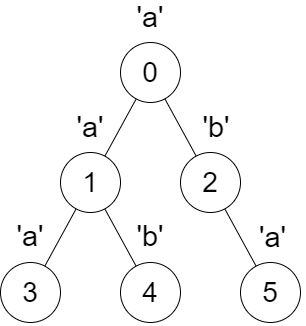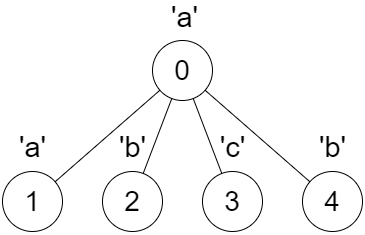LeetCode-in-Java
3327. Check if DFS Strings Are Palindromes
Hard
You are given a tree rooted at node 0, consisting of n nodes numbered from 0 to n - 1. The tree is represented by an array parent of size n, where parent[i] is the parent of node i. Since node 0 is the root, parent[0] == -1.
You are also given a string s of length n, where s[i] is the character assigned to node i.
Consider an empty string dfsStr, and define a recursive function dfs(int x) that takes a node x as a parameter and performs the following steps in order:
- Iterate over each child
yofxin increasing order of their numbers, and calldfs(y). - Add the character
s[x]to the end of the stringdfsStr.
Note that dfsStr is shared across all recursive calls of dfs.
You need to find a boolean array answer of size n, where for each index i from 0 to n - 1, you do the following:
- Empty the string
dfsStrand calldfs(i). - If the resulting string
dfsStris a palindrome, then setanswer[i]totrue. Otherwise, setanswer[i]tofalse.
Return the array answer.
A palindrome is a string that reads the same forward and backward.
Example 1:

Input: parent = [-1,0,0,1,1,2], s = “aababa”
Output: [true,true,false,true,true,true]
Explanation:
- Calling
dfs(0)results in the stringdfsStr = "abaaba", which is a palindrome. - Calling
dfs(1)results in the stringdfsStr = "aba", which is a palindrome. - Calling
dfs(2)results in the stringdfsStr = "ab", which is not a palindrome. - Calling
dfs(3)results in the stringdfsStr = "a", which is a palindrome. - Calling
dfs(4)results in the stringdfsStr = "b", which is a palindrome. - Calling
dfs(5)results in the stringdfsStr = "a", which is a palindrome.
Example 2:

Input: parent = [-1,0,0,0,0], s = “aabcb”
Output: [true,true,true,true,true]
Explanation:
Every call on dfs(x) results in a palindrome string.
Constraints:
n == parent.length == s.length1 <= n <= 1050 <= parent[i] <= n - 1for alli >= 1.parent[0] == -1parentrepresents a valid tree.sconsists only of lowercase English letters.
Solution
public class Solution {
private int time = 0;
private byte[] cs;
private int[][] graph;
public boolean[] findAnswer(int[] parent, String s) {
int n = s.length();
cs = s.getBytes();
graph = new int[n][];
final int[] childCount = new int[n];
for (int i = 1; i < n; i++) {
childCount[parent[i]]++;
}
for (int i = 0; i < n; i++) {
graph[i] = new int[childCount[i]];
childCount[i] = 0;
}
for (int i = 1; i < n; i++) {
graph[parent[i]][childCount[parent[i]]++] = i;
}
byte[] dfsStr = new byte[n];
int[] start = new int[n];
int[] end = new int[n];
dfs(0, dfsStr, start, end);
int[] lens = getRadius(dfsStr);
boolean[] ans = new boolean[n];
for (int i = 0; i < n; i++) {
int l = start[i];
int r = end[i];
int center = l + r + 2;
ans[i] = lens[center] >= r - l + 1;
}
return ans;
}
private void dfs(int u, byte[] dfsStr, int[] start, int[] end) {
start[u] = time;
for (int v : graph[u]) {
dfs(v, dfsStr, start, end);
}
dfsStr[time] = cs[u];
end[u] = time++;
}
private int[] getRadius(byte[] cs) {
int n = cs.length;
byte[] t = new byte[2 * n + 3];
int m = 0;
t[m++] = '@';
t[m++] = '#';
for (byte c : cs) {
t[m++] = c;
t[m++] = '#';
}
t[m++] = '$';
int[] lens = new int[m];
int center = 0;
int right = 0;
for (int i = 2; i < m - 2; i++) {
int len = 0;
if (i < right) {
len = Math.min(lens[2 * center - i], right - i);
}
while (t[i + len + 1] == t[i - len - 1]) {
len++;
}
if (right < i + len) {
right = i + len;
center = i;
}
lens[i] = len;
}
return lens;
}
}

